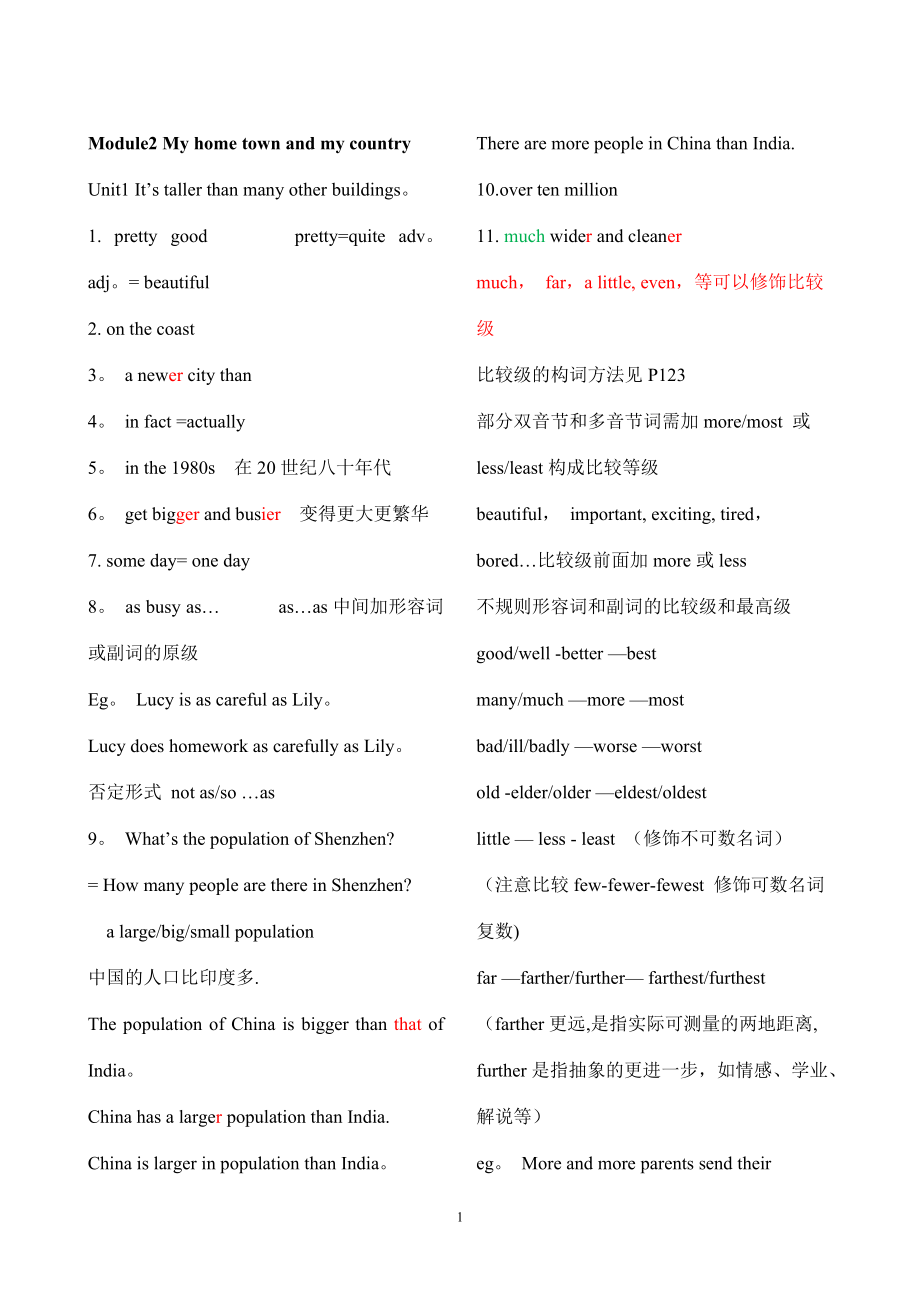《外研版英語(yǔ)八年級(jí)上冊(cè)Module 2單元知識(shí)點(diǎn)歸納總結(jié)(詳細(xì)版)》由會(huì)員分享,可在線閱讀�,更多相關(guān)《外研版英語(yǔ)八年級(jí)上冊(cè)Module 2單元知識(shí)點(diǎn)歸納總結(jié)(詳細(xì)版)(3頁(yè)珍藏版)》請(qǐng)?jiān)谘b配圖網(wǎng)上搜索。
1�、
Module2 My home town and my country
Unit1 It’s taller than many other buildings。
1. pretty good pretty=quite adv�。 adj。= beautiful
2. on the coast
3�。 a newer city than
4。 in fact =actually
5�。 in the 1980s 在20世紀(jì)八十年代
6。 get bigger and busier 變得更大更繁華
2�、
7. some day= one day
8。 as busy as… as…as中間加形容詞或副詞的原級(jí)
Eg�。 Lucy is as careful as Lily。
Lucy does homework as carefully as Lily�。
否定形式 not as/so …as
9。 What’s the population of Shenzhen?
= How many people are there in Shenzhen?
a large/big/small population
中國(guó)的人口比印度多.
Th
3�、e population of China is bigger than that of India。
China has a larger population than India.
China is larger in population than India�。
There are more people in China than India.
10.over ten million
11. much wider and cleaner
much, far�,a little, even,等可以修飾比較級(jí)
比較級(jí)的構(gòu)詞方法見(jiàn)P123
部
4�、分雙音節(jié)和多音節(jié)詞需加more/most 或less/least構(gòu)成比較等級(jí)
beautiful�, important, exciting, tired�, bored…比較級(jí)前面加more或less
不規(guī)則形容詞和副詞的比較級(jí)和最高級(jí)
good/well -better —best
many/much —more —most
bad/ill/badly —worse —worst
old -elder/older —eldest/oldest
little — less - least (修飾不可數(shù)名詞)
(注意比較few-fewer-fewest 修飾可數(shù)名詞復(fù)數(shù))
5、
far —farther/further— farthest/furthest
(farther更遠(yuǎn),是指實(shí)際可測(cè)量的兩地距離,further是指抽象的更進(jìn)一步�,如情感、學(xué)業(yè)�、解說(shuō)等)
eg。 More and more parents send their children to America to study further�。越來(lái)越多的家長(zhǎng)把他們孩子送到美國(guó)去深造。
12�。remember to do sth.
Unit2 Cambridge is a beautiful city in the east of England.
1. east/west/south/no
6、rth/ northeast東北/southeast東南 / northwest西北 /southwest西南
2. in/on/to the east of… 在…東面(范圍之內(nèi)/領(lǐng)土接壤/隔海相望)
Shanghai is in the east of China�。
Shanghai is on the east coast of China。
North Korea is on the east of China�。
Japan is to the east of China.
3。 on the River Cam/Thames在康河/泰晤士河河畔
4�。 have/with
7�、 a population of…有….人口(注意population本身包涵了人口的含義,不能和people連用)
區(qū)分有 have可做謂語(yǔ)動(dòng)詞�,with是介詞
Eg:China ____ (有)a population of more than 1。3 billion. (has)
China is a country ____ (有)a population of more than 1�。3 billion。(with)
5�。 be famous/known for/as…
Jiaxing is famous ____ the Party’s birthplace.(a
8、s)
Jiaxing is famous ____ the South Lake. (for)
6�。 old buildings and churches to visit
a good place to play
a comfortable chair to sit on
( 動(dòng)詞不定時(shí)做定語(yǔ),修飾前面的名詞)
7. He walked along the street alone.
(注意拼寫(xiě)不要混淆了!)
8�。 7�。5 million
讀作:seven and a half million
seven point five million
9、
(表示具體數(shù)字�,million后面不能加s
millions of (表示大概的數(shù)字,既有s又有of,記住“雙管齊下”)
1. England itself is part of an island�。
itself反身代詞, 表示強(qiáng)調(diào)
part of泛指某物的部分,意為不可分割的, eg: Taiwan is part of China�。
Humans are part of the nature.
10。 an island
11�。 low/high mountains
mountain是指高山,hill 是指低山、丘陵
in a low/loud v
10�、oice輕聲/大聲地說(shuō)
The prices of goods are high/low.
= The goods are expensive/cheap.
12。 notice sb .doing sth注意到某人正在做某事(強(qiáng)調(diào)動(dòng)作正在進(jìn)行)
notice sb�。 do sth注意到某人做某事(強(qiáng)調(diào)整個(gè)過(guò)程)
I noticed her smiling secretly.
= I noticed that she was smiling secretly。
我注意到她在偷偷地笑�。
I noticed a man enter the bank。
我注意到一個(gè)人進(jìn)了銀行�。
11、
13�。 never…or… = neither… nor…
Eg. He is never late for school or the meeting。他上學(xué)從不遲到�,開(kāi)會(huì)也不遲到.
14。 bring/take an umbrella with…
15�。 a university 一所大學(xué)( a useful tool)
a well—known university 一所著名大學(xué) well—known/better—known/best-known
16.show respect to… n。
The old are respected by the young in China.在中國(guó)老年人受到年輕人的尊敬�。V.
3
 外研版英語(yǔ)八年級(jí)上冊(cè)Module 2單元知識(shí)點(diǎn)歸納總結(jié)(詳細(xì)版)
外研版英語(yǔ)八年級(jí)上冊(cè)Module 2單元知識(shí)點(diǎn)歸納總結(jié)(詳細(xì)版)

